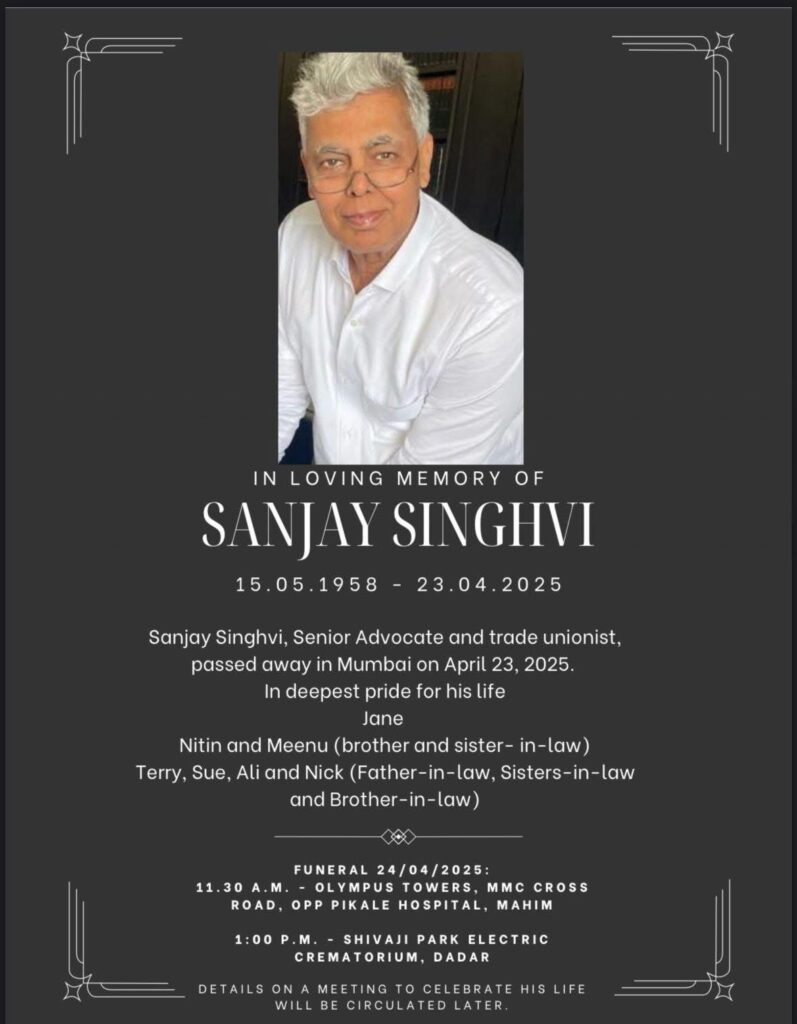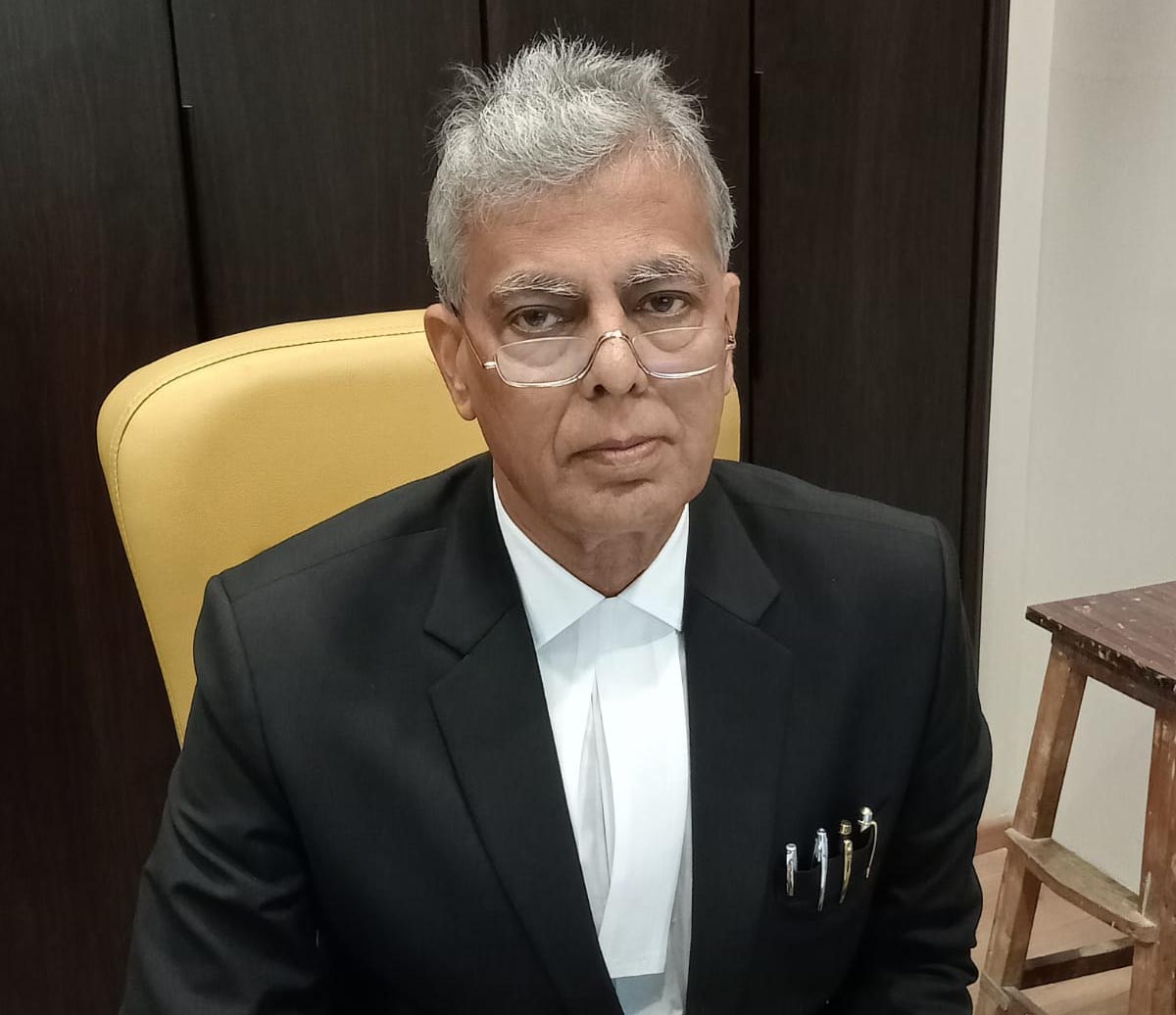A prominent political activist and associate of people’s movements apart being a senior advocate in the Bombay High Court, a critical participant in the struggles of Indian workers and a committed communist, Sanjay Singhvi passed away on April 23 at a Mumbai hospital at 68. He is survived by his partner, Jane Cox, also a lawyer and a brother and his family. Sanjay Singhvi had been suffering from terminal cancer.
His cremation took place at the Dadar electric crematorium on Thursday afternoon attended by over five hundred social and political activists, advocates. He was cremated to slogans of worker solidarity and unity. In a poignant moment that brought out the personal in the intensely political, Jane Cox placed a rose on his chest and bid farewell to her longstanding partner before the final moment of parting.

Sanjay Singhvi was the elder of two sons of senior advocate K K Singhvi and advocate, Pushpa Singhvi, both members of the undivided Communist Party of India (CPI) in their youth. He was educated at St Xavier’s School and then St Xavier’s College. He went on a hunger fast along with Ravindra Hazari when both of them were refused admission to their third year of B.Sc and BA respectively because of their “activities against the Principal and efforts to highlight pressing student issues”. In fact, their battle was for fair wages for the canteen workers. After a nine-day hunger strike, the college authorities had to give them admission, but not before a legal battle in which Indira Jaising appeared for both students!..
Recalling his immense contribution to the national and international worker’s movement as also the left–progressive movement in general, senior colleagues from the CPI (ML) commented on how Sanjay Singhvi’s approach and analysis always overcame organisational sectarianism. He consistently worked with the broader interests of the working class in mind and took on the responsibility of leadership with great dedication. He firmly believed in building a broad political front to resist anti-worker policies and fascist tendencies in the country, never allowing narrow-mindedness to weaken the movement. Whether it was the successful student struggle against fee hike during his studentship, the workers’ movement in Wagle Estate in Thane, international movement coordination, slum-dwellers’ rights struggles, struggle to defend democracy, Dalit liberation issues or any matter concerning the common people, Sanjay Singhvi left a strong mark.

Even while facing serious health challenges, he remained determined to return fully to the movement and continued to nurture that hope until the very end. He also gave a sharp edge to the working-class struggle with the vision of the Ambedkarite movement. Most notably, Sanjay Singhvi, as a founder and chief organizer of the T.U.C.I. (Trade Union Centre of India), worked tirelessly to nurture the organisation, which today has grown into a powerful tree with roots across the country.
As an advocate in the Bombay High Court, he appeared for workers, be it manual scavengers or others, pro bono with a zeal and commitment that is rare. He was also a regular counsel for the Bombay Union of Journalists (BUJ). Indira Jaisingh, co-founder of the Leaflet noted in the journal, how Sanjay Singhvi had argued against the validity of the law which extended working hours for factory workers beyond a twelve-hour day and won the fundamental issue of limited hours of work for the working class.
Sanjay Singhvi, too, belonged to a disappearing class of labour lawyers who did not represent management for ideological reasons. Today it is fashionable to say: “I will take any case that comes my way,” wrote Jaising. “Some of us make choices and he made his choices regarding which side of the line he wanted to be on,” she said.
His partner, Jane Cox, a law graduate from the Wadham College, Oxford, also a specialist in labour law, has also been representing trade unions and workers before the Bombay High Court for three decades.

On Thursday, April 24, at the Shivaji Park Dadar Electric Crematorium it was a rare and eclectic variety of mourners who had gathered. From fellow unionists and advocates like MJ Pande, Mihir Desai, Vijay Hiremath and others, journalist and writer, Geeta Seshu who with, MJ Pande was with both Sanjay and Jane in the final, gruelling months of medical treatment, there were workers from the TUCI who bid farewell. Filmmaker Anand Patwardhan and writer and academic, Anand Teltumbde were also present.
Related:
Victory for Trade Unions: Abolition of Contractual Engagement in Govt Jobs in Odisha and Rajasthan
Regime’s policies are anti-worker, anti-peasant, pro-corporate: Trade Unions

